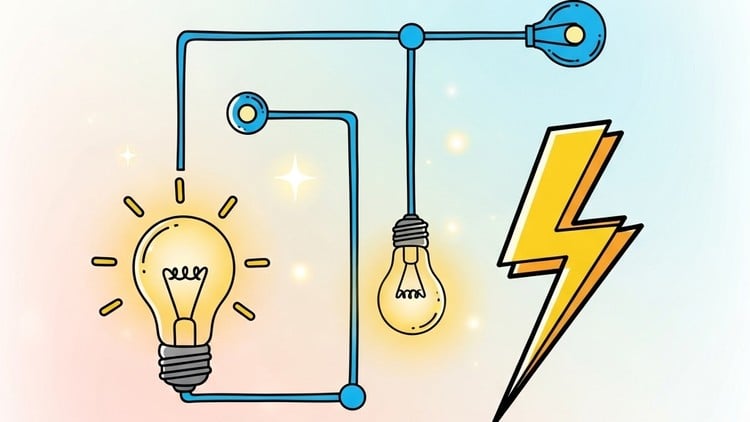
A Complete Beginner-Friendly Course of Electricity
⏱️ Length: 4.5 total hours
👥 374 students
🔄 September 2025 update
Add-On Information:
Note➛ Make sure your 𝐔𝐝𝐞𝐦𝐲 cart has only this course you're going to enroll it now, Remove all other courses from the 𝐔𝐝𝐞𝐦𝐲 cart before Enrolling!
- Course Overview
- This comprehensive 4.5-hour course offers a truly beginner-friendly introduction to electricity, demystifying complex concepts into engaging, digestible modules. It’s your essential first step toward understanding the fundamental forces powering our modern world.
- You’ll develop an intuitive grasp of the invisible mechanics behind electrical interactions, exploring how energy flows and manifests. This course builds a robust conceptual framework, empowering you to approach everyday devices with newfound clarity.
- Structured for maximum clarity and retention, the program ensures each new concept builds logically, creating a solid bedrock of knowledge. You’ll gain a foundational appreciation for principles governing everything from small circuits to large-scale power.
- This learning experience transforms your perception of electricity from a mysterious force into a logical, predictable science. It acts as an indispensable primer, clearing common misconceptions and establishing accurate insights.
- Requirements / Prerequisites
- Absolutely no prior experience or knowledge in electricity, electronics, or physics is needed. This course is meticulously designed for complete beginners, assuming no pre-existing familiarity.
- A curious and open mind, eager to explore and understand fundamental scientific principles, will be your most valuable asset. Your enthusiasm for learning how things work is key.
- Access to a computer or mobile device with a stable internet connection is required to access all course content and participate in interactive elements. All learning materials are delivered conveniently online.
- While optional, having a notebook and pen for personal notes or diagrams can significantly enhance your learning and retention. This aids in consolidating key takeaways.
- Skills Covered / Conceptual Tools Used
- Develop the ability to conceptually trace the path of electrical energy through various mediums, understanding its generation, transmission, and consumption. You’ll visualize unseen flows within a circuit.
- Gain proficiency in interpreting basic circuit diagrams and schematics, translating graphical representations into a functional understanding of electrical systems. This foundational skill is crucial for future studies.
- Master the art of predicting electrical behavior based on material properties, differentiating how substances interact with charges. Learn why materials serve as pathways or barriers in electrical design.
- Acquire the fundamental framework for analyzing simple electrical systems, breaking down setups into core components and understanding their roles. This analytical approach forms the bedrock of electrical problem-solving.
- Cultivate a precise understanding of the interrelationships between key electrical quantities – how changes in resistance, current, or voltage impact each other. This fosters a holistic view of circuit dynamics.
- Familiarize yourself with conceptualizing electrical safety principles, fostering an awareness of potential hazards and best practices. This promotes responsible engagement with electrical systems.
- Benefits / Outcomes
- You will emerge with a robust and confident understanding of fundamental electrical concepts, providing a solid academic and practical launchpad for further STEM studies or hobbies.
- Gain the capacity to demystify household electricity, comprehending basic wiring, appliance specifications, and making informed decisions about safety and energy consumption.
- Develop an enhanced ability to critically evaluate and understand technical specifications for various electronic devices. This fosters a more informed approach to consumer electronics.
- Acquire initial conceptual tools to troubleshoot simple electrical issues, empowering you to approach minor problems with a basic diagnostic mindset.
- Lay the groundwork for engaging in electrical hobbies like robotics, home automation, or DIY electronics projects, providing core knowledge to confidently explore these exciting areas.
- PROS
- Exceptionally Beginner-Friendly: Assumes zero prior knowledge, making it perfect for anyone starting their electrical learning journey.
- Concise and Focused: Delivers core concepts efficiently in 4.5 hours, respecting your time while providing a comprehensive foundation.
- Conceptual Clarity: Prioritizes understanding the ‘why’ and ‘how’ behind electrical phenomena, building intuitive knowledge.
- Practical Foundation: Equips learners with essential conceptual tools applicable to real-world electrical understanding and future studies.
- CONS
- Limited Hands-On Experience: As a short, introductory course, it primarily focuses on theoretical and conceptual understanding rather than extensive practical lab work or detailed project building.
Learning Tracks: English,Teaching & Academics,Engineering
Found It Free? Share It Fast!